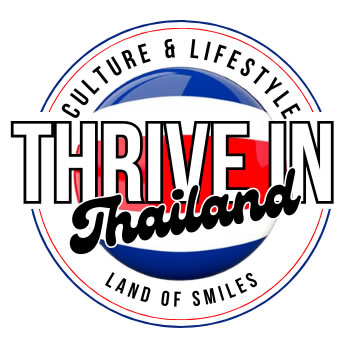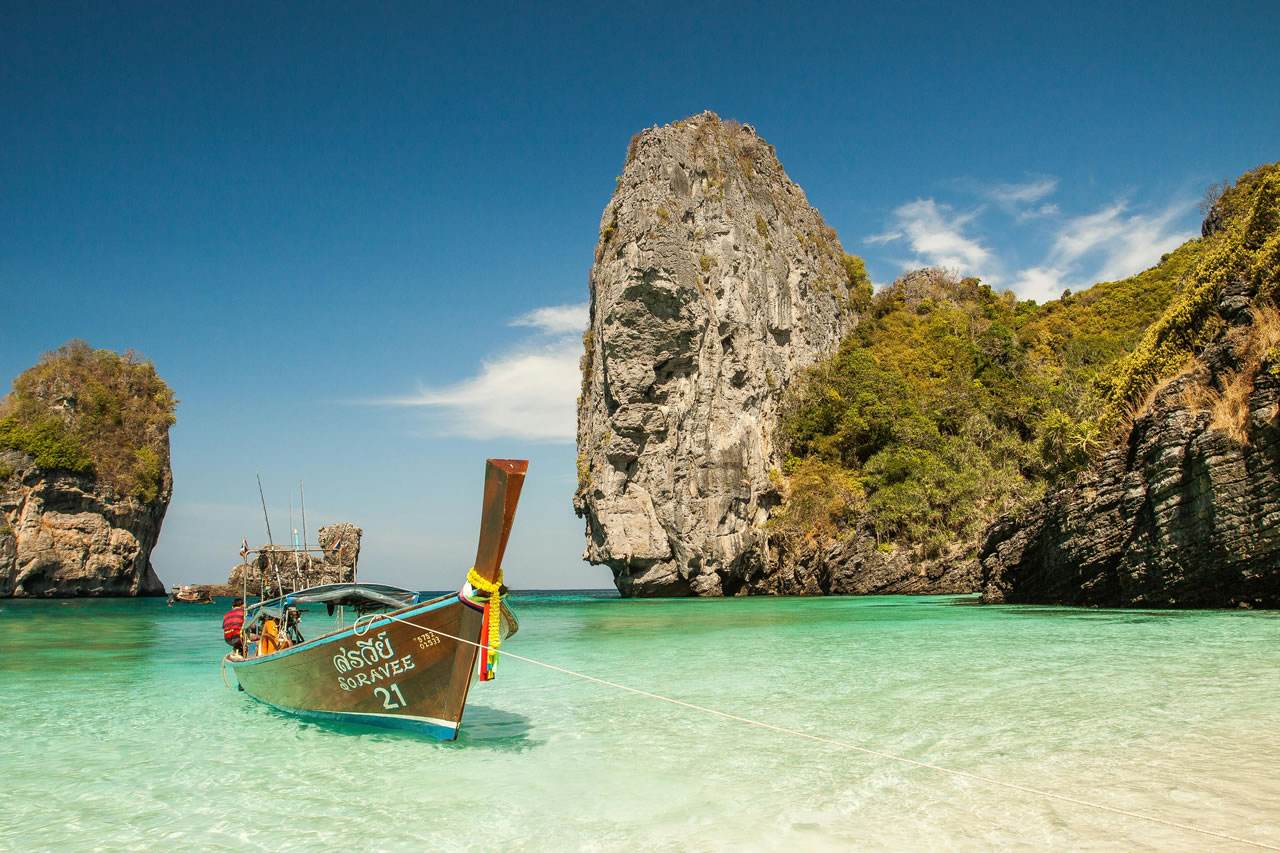Thailand is often described as a dream destination, which is true in many ways. With its warm climate, friendly locals, vibrant culture, and relatively low cost of living, it comes as no surprise that so many people choose to settle down in the Land of Smiles.
But living here isn’t without its challenges. Besides all the charm, beauty, and opportunity, there quite possibly can be frustrating aspects as well—like adjusting to cultural differences, navigating chaotic traffic, or dealing with bureaucracy.
In this article, I point out the pros and cons of living in Thailand as an expat. I’ll start with the general advantages and drawbacks, then move on to comparing what life looks like for retirees, digital nomads, and families. We’ll also look at Thailand versus its Southeast Asian neighbors. This information contributes to your decision-making process in determining whether the Land of Smiles is the right place for you.
Thinking about a long-term move to Thailand?
Before diving into the pros and cons, it can help to step back and assess how prepared you actually are for life in Thailand beyond the initial appeal.
General Pros of Living in Thailand
- Affordability
Thailand offers excellent value for money. From housing to food, healthcare to transportation, daily expenses are considerably lower than in Western countries—allowing many expats to live well on modest budgets.
- Culture & Lifestyle
The Thai way of life emphasizes respect, relaxation, and community. With countless festivals, temples, and markets, life in Thailand is rich in tradition and full of character.
- Weather & Nature
Year-round sunshine, tropical beaches, lush mountains, and island getaways make Thailand a paradise for outdoor lovers and sun-seekers.
- Expat Community & Social Life
Thailand has well-established expat hubs in cities like Chiang Mai, Bangkok, and Phuket, where you’ll find active communities, social events, meetups, and a support network to help you settle in.
- Healthcare Quality & Cost
Thailand’s private hospitals are modern, efficient, and affordable. Whether it’s routine checkups or major surgery, the quality of care is often comparable to Western countries—at a fraction of the cost.
- Food Scene
From world-famous street food to fine dining, Thailand offers a mouthwatering array of local and international cuisine. Meals are affordable, delicious, and always an adventure.
- Regional & Domestic Travel Options
Thailand’s central location makes regional travel easy and affordable, with short flights to Vietnam, Cambodia, Malaysia, and beyond. Domestically, it’s easy to explore beaches, islands, jungles, and mountains.
- Safety
Violent crime is rare, especially in comparison to Western cities. Most expats feel secure in daily life, even when walking alone at night in major cities.
- Freedom (Live & Let Live)
Thailand offers a relaxed lifestyle where expats can live more freely. As long as you respect local customs and laws, you’re largely left to live how you choose.
General Cons of Living in Thailand
- Visa Complications
Navigating Thailand’s visa system can be confusing and time-consuming, with varying rules, frequent changes, and mandatory 90-day check-ins or immigration reporting that can frustrate even seasoned expats.
- Language Barrier
While English is widely spoken in tourist areas, it’s far less common in rural regions and among government services—making daily errands, official documents, and even doctor visits more challenging without some Thai language skills.
- Traffic & Transport Issues
Cities like Bangkok suffer from heavy traffic congestion, while public transport outside major urban centers is limited or non-existent, forcing many expats to rely on motorbikes or private vehicles.
- Weather Extremes
Thailand’s hot, humid climate can be draining—especially for newcomers—and the rainy season can bring flooding, while northern regions like Chiang Mai face seasonal air pollution during “burning season.”
- Cultural Differences & Adaptation
Adjusting to a new cultural rhythm can take time; values like “saving face,” indirect communication, and a slower approach to time and urgency may feel confusing or frustrating to Westerners used to directness. Read my in-depth guide
- Bureaucracy & Legal Uncertainty
Paperwork in Thailand often requires in-person visits, multiple copies, and seemingly arbitrary procedures—and immigration laws or visa regulations can change suddenly with little notice.
- Far Away from Home
Living in Thailand means being geographically distant from family and friends, which can lead to feelings of isolation, expensive visits home, and missing important life events back in your home country.
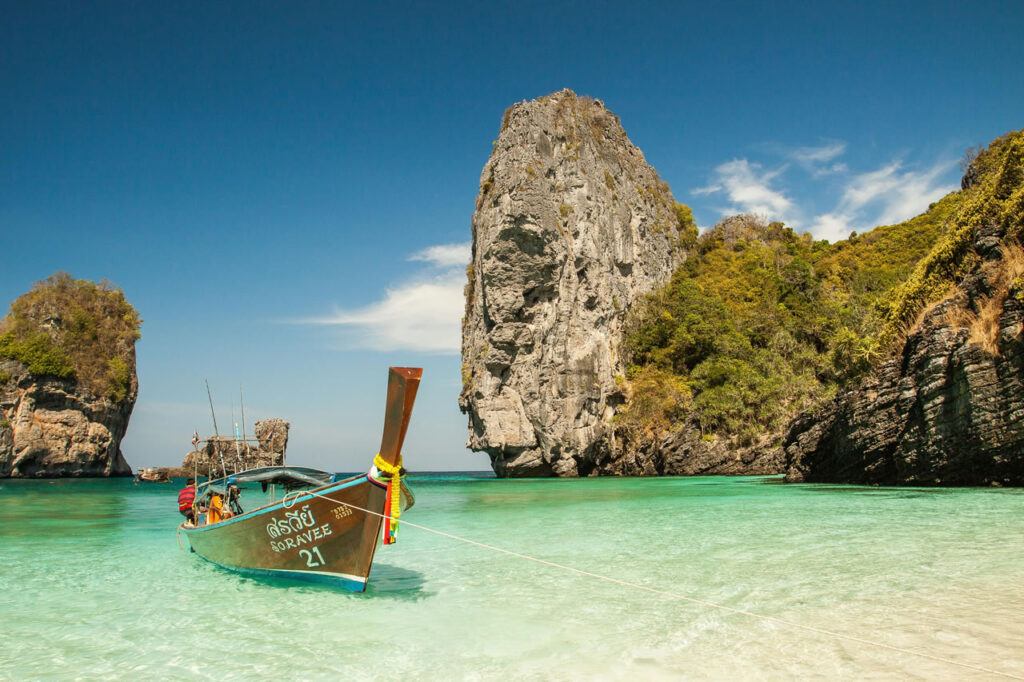
Living in Thailand as a Retiree
Pros
- Retirement-Friendly Visas
Thailand offers long-stay visas specifically for retirees, such as the O, O-A, and O-X visas, providing options for those looking to settle into a peaceful lifestyle.
- High-Quality, Affordable Healthcare
Private hospitals offer excellent care at prices significantly lower than in the West, making Thailand a top choice for medical tourism and long-term care.
- Long-Term Healthcare Options
From assisted living to nursing homes, Thailand is expanding its eldercare offerings—especially in areas with large expat populations—allowing retirees to age comfortably in place.
- Warm Climate and Outdoor Lifestyle
The year-round warm weather supports an active, outdoor lifestyle, with opportunities for swimming, walking, and enjoying nature even into later years.
- Community and Social Life
Many cities have active retiree networks, with golf clubs, language classes, meetups, and dinners, helping newcomers quickly find their tribe.
- Affordable Domestic Help and Services
Hiring household help or even personal caregivers is common and affordable, providing retirees with support and comfort that may be out of reach in Western countries.
Cons
- Visa Requirements Can Be a Headache
Financial proof, insurance documents, and annual renewals can be time-consuming and intimidating—especially for retirees unfamiliar with Thai bureaucracy.
- Health Insurance May Be Required or Expensive
Mandatory health insurance for certain visa types (like O-A) can be hard to qualify for or costly for older applicants with pre-existing conditions.
- Cultural and Language Barriers
Everyday tasks like speaking with landlords, going to the pharmacy, or dealing with service providers can be frustrating without a basic grasp of Thai.
- Distance from Family
Being far from adult children and grandchildren can lead to loneliness and limited family interaction, especially during holidays or health issues.
- Heat and Humidity
Constant heat can take a toll, especially on older bodies, and may limit time spent outdoors—particularly in April and May when it gets hottest.
- Mobility Challenges and Poor Walkability
Obstructed sidewalks, lack of elevators, and uneven terrain can make life difficult for retirees with mobility issues or chronic conditions.
For many retirees, Thailand offers an enviable mix of comfort, affordability, and quality of life. The healthcare is excellent, the lifestyle is relaxed, and the social opportunities are plentiful—especially in areas with established expat communities.
Still, the bureaucratic hurdles, climate, and distance from family can be real considerations. Retiring in Thailand isn’t for everyone, but for those who value independence, adventure, and a lower cost of living, it can be a rewarding place to spend your golden years.
🔗 Related Guides for Retirees in Thailand
- Thailand Retirement Visa: Requirements & How to Apply
- Long-Term Care Options for Foreigners in Thailand
- Language Barriers for Foreigners in Thailand
- Homesickness for Foreigners Living in Thailand
- Coping With Heat and Humidity in Thailand
Living in Thailand as a Digital Nomad
Pros
- Affordable Lifestyle with High Quality of Life
Nomads can enjoy a great standard of living without draining their savings—whether they prefer big cities or small islands.
- Coworking Spaces and Cafés Galore
From Bangkok to Chiang Mai to Koh Phangan, Thailand has a thriving ecosystem of coworking spaces and laptop-friendly cafés with solid Wi-Fi.
- Established Digital Nomad Hubs
Chiang Mai, Bangkok, and many islands have active digital nomad scenes with meetups, events, and online communities for networking and support.
- New Digital Nomad Visa: Destination Thailand Visa (DTV)
Thailand’s new DTV allows remote workers to stay legally for up to 5 years, marking a major step forward in long-term visa options.
- Vibrant Lifestyle and Travel Opportunities
Whether you’re into Muay Thai, meditation, hiking, or weekend island-hopping, Thailand offers plenty of ways to recharge between work sessions.
✅ Want to work online while living in Thailand without the guesswork?
Discover one of the most trusted platforms digital nomads use to build real, consistent income from anywhere!

Get Straightforward, Affordable Training That Works!
- Step-by-Step Training
- Website Builder & Hosting
- Jaaxy (Keyword Research)
- AI Article Designer
- Live Expert Classes
- On-Demand Webinars
- Business Hubs
- Revenue Opportunity Finder
- Community & Mentorship
- No Upsells, No Contracts!
Cons
- DTV Still Relatively New and Unfamiliar
Because it’s still being rolled out, requirements may evolve, and not all immigration offices may be up to speed with the details.
- Internet Can Be Inconsistent in Rural Areas
Internet is generally good in cities, but nomads working in more remote areas should prepare for occasional slowdowns or outages.
- Burnout and Lack of Work-Life Balance
With so many distractions and “vacation vibes,” it’s easy to fall into a cycle of overwork or over-indulgence if routines aren’t maintained.
- Legal Gray Areas Still Exist for Non-DTV Nomads
Working on a tourist visa can violate Thai immigration rules, and while enforcement is rare, it adds a level of uncertainty. Planning to earn locally or hire staff? Read Start a Business in Thailand (company types, Non-B/Work Permit, taxes, compliance).
Thailand remains one of the most attractive destinations for digital nomads worldwide. With affordable living, inspiring surroundings, and growing visa options, it’s a top-tier choice for remote professionals. Still, understanding the legal landscape and finding the right balance between work and play is key to making it a sustainable base for the long haul.
🔗 Related Guides for Digital Nomads in Thailand
- Why Chiang Mai is a Top Destination for Digital Nomads
- Destination Thailand Visa (DTV): Full Guide
- Explore Thailand’s best places for remote work
- Revolut for Expats in Thailand (2025): What You Need to Know
Living in Thailand as an Expat Family
Pros
- International Schools with Western Curricula
Thailand has a growing number of international schools offering British, American, IB, and bilingual programs—giving families confidence in their children’s education while maintaining global academic standards.
- Affordable Domestic Help and Childcare
Hiring nannies, housekeepers, or even drivers is common and affordable, helping busy parents focus on work, family time, or personal wellbeing without the high costs associated with similar services in Western countries.
- Outdoor Lifestyle and Travel Opportunities
Families can enjoy a wide range of kid-friendly activities—beaches, mountains, zoos, waterfalls, and temples—plus the chance to travel affordably across Thailand and the wider Southeast Asia region.
- Safe and Family-Oriented Culture
Thailand is generally safe and welcoming to children. Locals are often warm and helpful toward families, and many public spaces are family-friendly, especially in larger cities and tourist areas.
- Established Expat Communities
Cities like Bangkok, Chiang Mai, and Phuket have well-established expat circles, including family-specific groups, playdates, and parenting support networks that can help newcomers feel connected and supported.
- Lower Cost of Living Compared to the West
While schooling may be pricey, other aspects of family life—like groceries, housing, transportation, and extracurriculars—are typically much more affordable than in Europe, North America, or Australia.
Cons
- High Cost of International Schooling
International school tuition can be a major expense, especially for families with multiple children. Fees often rival or exceed private schools in the West, and spots in top-tier schools can be competitive.
- Healthcare Navigation for Children
While top hospitals in Bangkok and Chiang Mai offer excellent pediatric care, quality and availability may be limited in more rural or remote areas—sometimes requiring long travel for specialized treatment.
- Cultural Adjustment for Children
Moving to a new country and adapting to a different language and culture can be emotionally challenging for kids, particularly teens. Making friends, fitting in, and adapting to new school systems can take time.
- Limited Support for Special Needs
Access to special education programs, behavioral therapy, or developmental services can be limited, inconsistent, or expensive, particularly outside of Bangkok or the international school system.
- Climate and Pollution Concerns
The intense heat and humidity may be uncomfortable for young children, and air pollution—especially during Northern Thailand’s burning season—can pose real health risks for sensitive individuals.
- Long Commutes and Limited Socializing Outside School
Many families live far from international schools, leading to long daily commutes. In suburban or rural areas, kids may also have fewer opportunities to socialize outside of school hours.
Thailand can be a wonderful place to raise a family, with its welcoming culture, active lifestyle, and supportive expat communities. However, the challenges—especially around education, healthcare access, and adapting to a new environment—require careful planning.
For families willing to embrace a new way of life and stay flexible, the rewards often outweigh the trade-offs.
🔗 Related Guides for Expat Families in Thailand
- International Schools in Thailand: Compare Options & Fees
- Cost of Living in Thailand: Monthly Breakdown
- Expat Communities & Social Life in Thailand
- Parenting in Paradise: Raising Kids in Thailand as an Expat
- Wise (TransferWise) Review for Expats in Thailand: Fast, Low-Cost Transfers & a Multi-Currency Account That Works
How Does Thailand Compare to Other Southeast Asian Countries?
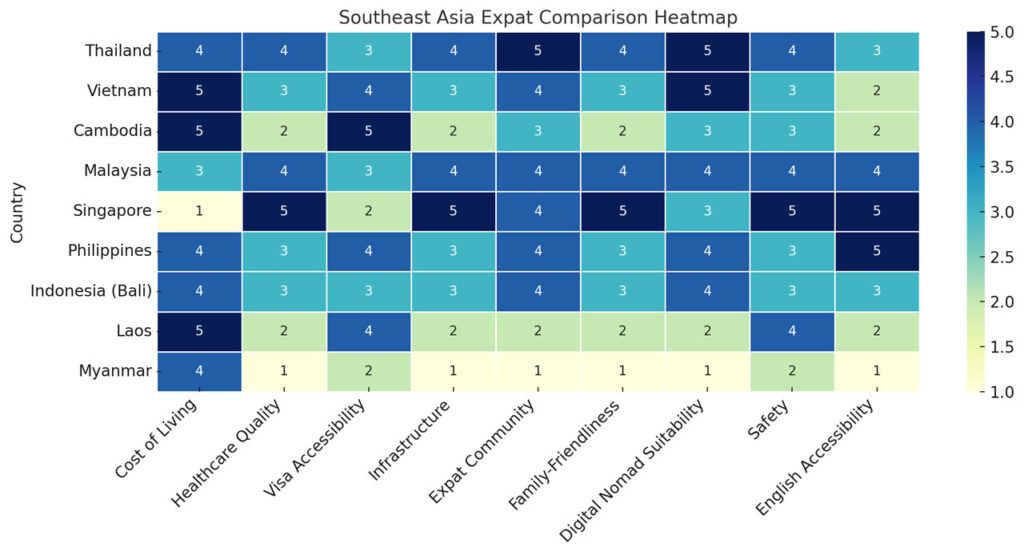
🇻🇳 Vietnam
- Cost of Living: ✅ Cheaper than Thailand in most cities
Vietnam remains one of the most affordable places in Southeast Asia, especially outside of Hanoi and Ho Chi Minh City, making it attractive to budget-conscious expats and digital nomads.
- Infrastructure & Healthcare: Improving but still behind Thailand
Major cities have seen significant development, but rural areas still face infrastructure gaps, and healthcare quality is more variable compared to Thailand’s private hospitals.
- Visa Accessibility: Reasonable, but lacks long-term options for many expats
Vietnam offers business and tourist visas, but lacks a strong retirement or digital nomad visa, often requiring frequent renewals or workaround strategies.
- Expat Friendliness: Growing rapidly, especially among digital nomads
A younger, entrepreneurial expat scene is thriving in Vietnam, especially in Da Nang and HCMC, though language barriers and cultural differences still exist.
Best For: Budget-conscious nomads, young entrepreneurs, and fast-paced lifestyles
Vietnam’s energy, affordability, and growing startup scene make it ideal for those looking for momentum and low living costs.
🇰🇭 Cambodia
- Cost of Living: ✅ One of the lowest in the region
Cambodia offers incredibly cheap rent, food, and services—ideal for expats looking to stretch their budget as far as possible.
- Infrastructure & Healthcare: Lagging behind Thailand
Outside of Phnom Penh and Siem Reap, infrastructure is often basic, and reliable healthcare options are limited, often requiring travel to Thailand for serious treatment.
- Visa Accessibility: Very relaxed, long-term stays are easy
Cambodia is famous for its flexible visa policies, with easy extensions and minimal paperwork, making it stress-free for long-term stays.
- Expat Friendliness: Small but welcoming expat communities
Expats often describe life in Cambodia as easygoing and community-driven, particularly in popular towns like Kampot and Sihanoukville.
Best For: Budget retirees and laid-back long-termers
The slow pace of life, low cost, and lenient visa system appeal to retirees and expats who prioritize simplicity over services.
🇲🇾 Malaysia
- Cost of Living: Similar to Thailand overall
While housing and food can be slightly cheaper, international school fees and imported goods balance things out, making costs comparable to Thailand.
- Infrastructure & Healthcare: Excellent and English-speaking
Malaysia boasts some of the best infrastructure in the region, and its healthcare system is both high-quality and easy to navigate in English.
- Visa Accessibility: MM2H retirement visa is attractive but evolving
Malaysia’s “Malaysia My Second Home” (MM2H) visa has long been a draw for retirees, though recent changes have made it more restrictive.
- Expat Friendliness: High, especially in KL and Penang
English is widely spoken, and multiculturalism makes it easier for expats to settle in without a steep cultural learning curve.
Best For: Retirees, families, and structured expat life
Malaysia suits those looking for comfort, convenience, and a more organized lifestyle—especially families and older expats.
🇸🇬 Singapore
- Cost of Living: 💰 Highest in the region
Singapore is world-class but comes with a hefty price tag—expect to pay premium prices for rent, food, education, and entertainment.
- Infrastructure & Healthcare: World-class in every respect
Everything from public transport to healthcare operates efficiently and at global standards, making it ideal for professionals and families with higher budgets.
- Visa Accessibility: Limited unless sponsored or highly skilled
Most long-term visas are tied to employment or investment, which makes it hard for retirees or freelancers to settle here without corporate backing.
- Expat Friendliness: Excellent for professionals and families
With its safety, cleanliness, and world-class schools, Singapore is one of the most expat-friendly cities in Asia—if you can afford it.
Best For: Corporate expats, high-income families, career-driven professionals
Singapore is ideal for those looking for economic opportunity and top-tier quality of life, especially within international industries.
🇵🇭 Philippines
- Cost of Living: Moderate, depends on location
Costs are low in rural areas and smaller islands, but prices can climb in major hubs like Manila or Cebu.
- Infrastructure & Healthcare: Inconsistent
While improvements are happening, public infrastructure and healthcare can be unreliable, especially during emergencies or in less urbanized regions.
- Visa Accessibility: Straightforward for many nationalities
The Philippines offers easy tourist visa extensions and relatively simple long-stay options, including for retirees.
- Expat Friendliness: High—English is widely spoken
English is an official language, which makes daily life and social integration easier than in most other Southeast Asian countries.
Best For: Retirees and expats who prioritize language and beach life
The Philippines is perfect for those who want to live by the sea, integrate easily, and avoid language hurdles.
🇮🇩 Indonesia (Bali)
- Cost of Living: Similar to Thailand, with some pricey tourist zones
Bali can be very affordable if you live like a local—but prices jump significantly in expat-heavy areas like Canggu and Ubud.
- Infrastructure & Healthcare: Patchy outside cities
Internet, roads, and hospitals are generally decent in urban areas, but much weaker in smaller villages or remote parts of the island.
- Visa Accessibility: Improving with digital nomad options
Indonesia is moving toward more remote work–friendly policies, but long-term stays still often require creative visa strategies.
- Expat Friendliness: High in Bali, especially for creatives
Bali’s spiritual vibe, wellness culture, and global nomad community make it a magnet for artists, freelancers, and lifestyle entrepreneurs.
Best For: Spiritual seekers, creatives, and slow travelers
With yoga studios, eco-communities, and retreats around every corner, Bali is ideal for those seeking a slower, intentional lifestyle.
🇱🇦 Laos
- Cost of Living: ✅ Very low
Laos offers a quiet, inexpensive lifestyle, ideal for minimalists or those seeking to unplug from the modern world.
- Infrastructure & Healthcare: Minimal
Services are basic even in the capital, and many expats still travel to Thailand for major healthcare needs or specialized services.
- Visa Accessibility: Fairly relaxed
Laos offers flexible visa extensions and border runs are usually straightforward, especially for nearby Thai border crossings.
- Expat Friendliness: Modest communities in Vientiane and Luang Prabang
Laos has a small but loyal expat base, most of whom appreciate the country’s slow pace and cultural authenticity.
Best For: Minimalists and peace-seeking expats
Ideal for those who want simplicity, quiet, and a slower rhythm of life—without needing Western comforts.
🇲🇲 Myanmar
- Cost of Living: Low
Myanmar is very affordable, with inexpensive rent, transport, and food—even in urban areas.
- Infrastructure & Healthcare: Poor and unstable
Services are limited, even in Yangon, and the healthcare system lacks modern facilities, supplies, and staff.
- Visa Accessibility: Currently difficult due to political situation
Due to ongoing instability, visas are harder to obtain and often subject to sudden changes or suspension.
- Expat Friendliness: Low given the current climate
While locals are warm, safety concerns and political unrest have pushed many expats to leave or avoid Myanmar for now.
Best For: Adventurous expats (under stable conditions)
Myanmar offers incredible depth and cultural richness—but at present, it’s not a viable option for most expats due to ongoing turmoil.
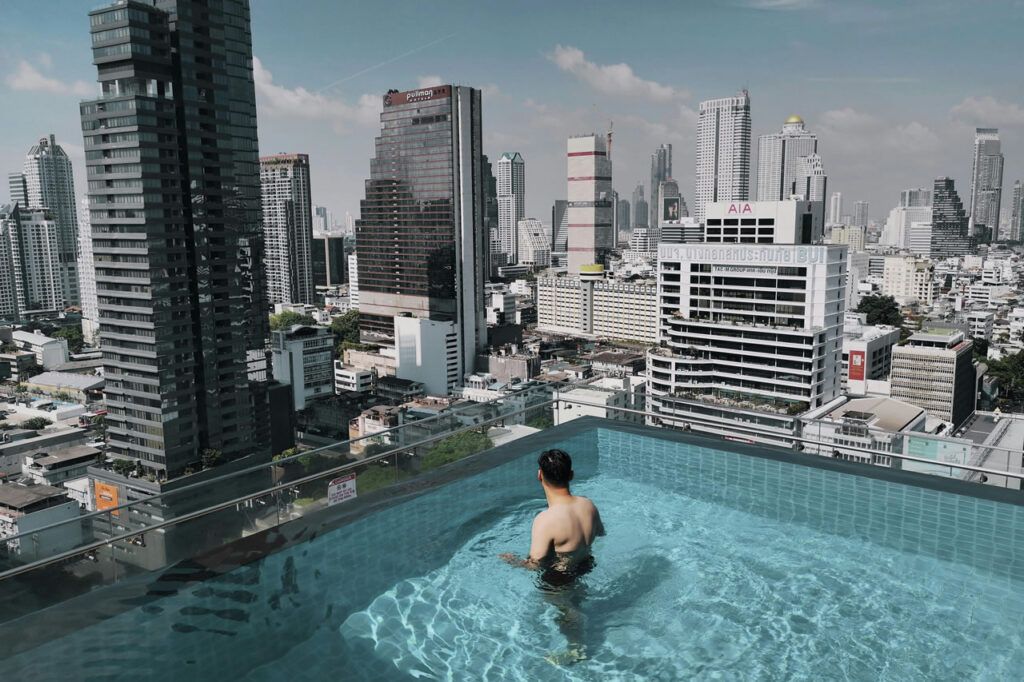
Frequently Asked Questions About Living in Thailand as an Expat
Living in Thailand comes with practical questions about visas, healthcare, housing, and daily life. Below are straightforward answers to some of the most common concerns expats face when planning a move or settling in long-term.
How long can I stay in Thailand without a visa?
Most nationalities can enter visa-free for 30 days (often extendable once at immigration). If you need a longer stay or want more certainty before you fly, see my Thailand Tourist Visa: requirements, single vs. multiple entry, and extensions—and for stays beyond that, you’ll need a proper long-stay visa (retirement, education, DTV, etc.).
📌 Need options? Explore Thailand’s long-term visa pathways
Can I work remotely from Thailand without breaking any rules?
Yes—if you have the right visa. The Destination Thailand Visa (DTV) now allows digital nomads to stay legally while working for overseas clients. Tourist visas, however, do not permit remote work.
✅ Learn how the DTV works and who qualifies
📌 Prefer local employment over remote work? Start here: How to Find a Job in Thailand (roles, hiring channels, Non-B + work permit basics).
Can foreigners buy property in Thailand?
While land ownership is off-limits to foreigners, you can legally own condominiums, lease land, or explore other structures—though some carry legal risks. Always get proper legal advice before committing.
📌 For a full breakdown of your options, see this guide to property ownership for foreigners
Do I need private health insurance to live in Thailand?
Some visa types, like the O-A Retirement Visa, require it. Even when it’s optional, private insurance is strongly recommended for access to quality care at private hospitals.
📌 Compare your options in my Thailand Health Insurance Guide
Which areas in Thailand are best for long-term expat living?
It depends on your lifestyle. Bangkok offers convenience, Chiang Mai is relaxed and budget-friendly, while islands like Phuket or Koh Samui offer beach life.
📌 Find your perfect fit in this comparison of the best places to live in Thailand
What are the best places to visit before deciding where to live?
Many expats take a “scouting trip” first—visiting cities, islands, and mountain towns to get a feel for what suits them.
📌 Start planning with this curated list of top places to visit in Thailand
Can I open a Thai bank account as a foreigner?
Yes. Most banks allow foreigners to open an account with a valid visa, passport, and proof of address—though requirements vary by bank and branch.
📌 Here’s how to get started: opening a bank account in Thailand
What hidden costs should expats budget for?
Often-overlooked expenses include visa renewals, health insurance, school fees (for families), condo maintenance charges, and immigration-related travel. Budgeting for these will prevent financial surprises.
Are there strict laws about nightlife and drinking alcohol in Thailand?
Yes, and many expats are surprised by them. Alcohol can only be sold during certain hours, “dry days” tied to religious or political events are common, and some areas have special licensing rules that affect where and when you can drink. Enforcement is often inconsistent—but getting it wrong can still lead to fines or worse.
📌 For the full story, read my complete guide to alcohol laws and nightlife rules in Thailand.
Living in Thailand as an expat can be a deeply rewarding experience—but it’s not without its trade-offs. For many, the warm climate, vibrant culture, affordable lifestyle, and welcoming communities make it a dream destination. For others, the challenges—bureaucracy, climate extremes, language barriers, and distance from home—can take some getting used to.
The key is knowing what you value most. If you’re looking for comfort and community, Thailand delivers. If you crave structure, ease, or English-speaking environments, other countries in the region might suit you better. But if you’re up for a bit of adventure, flexibility, and cultural immersion, Thailand has a way of winning hearts—sometimes in unexpected ways.
No place is perfect, but Thailand offers a balance that few countries can match. Whether you’re retiring, working remotely, raising a family, or just searching for a new chapter, life here can be as enriching as it is unpredictable.
Sawasdee Krub, and best of luck on your journey!
📌 Found this content helpful?
If this balanced view helped your decision, a coffee is a kind thank-you that supports honest, ad-free content.

Founder of Thrive in Thailand
Long-term expat living in Thailand—sharing culture, insights, and real-life farang wisdom, one story at a time!
Every expat experience is different—what’s yours been like?
Share your wins, your frustrations, or that one thing you wish someone had told you before moving to Thailand. Join the conversation below...
